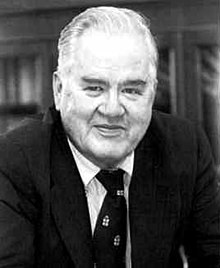John W. Tukey
John Wilder Tukey ForMemRS (/ˈtuːki/; June 16, 1915 – July 26, 2000) was an American mathematician best known for development of the FFT algorithm and box plot. The Tukey range test, the Tukey lambda distribution, the Tukey test of additivity, and the Teichmüller–Tukey lemma all bear his name.
Tukey was born in New Bedford, Massachusetts in 1915, and obtained a B.A. in 1936 and M.Sc. in 1937, in chemistry, from Brown University, before moving to Princeton University where he received a Ph.D. in mathematics.
During World War II, Tukey worked at the Fire Control Research Office and collaborated with Samuel Wilks and William Cochran. After the war, he returned to Princeton, dividing his time between the university and AT&T Bell Laboratories. He became a full professor at 35 and founding chairman of the Princeton statistics department in 1965.
Among many contributions to civil society, Tukey served on a committee of the American Statistical Association that produced a report challenging the conclusions of the Kinsey Report, Statistical Problems of the Kinsey Report on Sexual Behavior in the Human Male.
...
Wikipedia

